Reviews
Le dernier métro
François Truffaut
France, 1980
Credits
Review by Evan Kindley
Posted on 22 April 2010
Source Criterion Collection DVD
Set during the last years of the German Occupation of France, The Last Metro tells the story of Lucas Steiner, a Jewish theater director who is forced to hide out in his cellar of his Parisian theater in order to escape Nazi persecution. He is aided in this by his wife Marion (played by Catherine Deneuve), the lead actress in the production they are currently mounting of a Norwegian play, ironically titled La disparue (The Disappearance). Lucas is a curious figure: listening to anti-Semitic radio broadcasts and reading the latest propaganda from his basement dwelling, he is less angry than amused; he puts on a fake nose, telling his wife that he is “trying to feel Jewish”; the real danger of his situation never seems to dawn on him. Moreover, he remains intent on maintaining control over the production from underground, listening in and giving notes to Marion which she relays in turn to the show’s nominal director, Jean-Loup Cottins. Lucas sees himself as a director first and a Jew second – even when circumstances would seem to force him to affirm the latter identity in lieu of the former.
The Last Metro derives its primary narrative tension from the possibility of Lucas’ discovery — a classic suspense situation if ever there was one — but, surprisingly, Truffaut refrains from reviving the techniques he learned from Hitchcock and employed so extensively in sixties films like The Bride Wore Black and Fahrenheit 451. Instead the film is episodic, even meandering, an anecdotal exploration of the theatrical life that looks back to Renoir’s The Golden Coach and forward to something like Mike Leigh’s Topsy Turvy. In Truffaut’s own filmography, the most obvious precedent for The Last Metro is Day for Night: it provides the same “behind the scenes” view of the theater that that film did of the cinema, and Truffaut conceived of both films as “part of a trilogy whose last panel, still to be made, will concern the music hall.”1 But the films, despite surface similarities, are actually quite different. In contrast to Day for Night, where work is all, in The Last Metro there’s a counterweight to the preoccupations of show business, a palpable sense that there are stakes beyond those recognized by the little milieu it concerns itself with.
Again, while Day for Night adopted a documentary style, preserving in more “mature” and domesticated form something of the original New Wave spirit, The Last Metro is a studio picture through and through, one that recreates its period with an exacting sense of detail but also a certain cautiousness, as if afraid of uncovering psychic landmines in the course of its excavations. Once more displaying his versatility and intelligence, cinematographer Néstor Almendros limits the film’s color palette to blacks, browns and grays, appropriate for a time of shortages and curfews, reserving red for the stage décor. Almost all the scenes are interiors — Truffaut being of the opinion that “a film about the Occupation should take place almost entirely at night and in closed places”2 — which places The Last Metro far from the plein air style favored by the early New Wave. If movies like Shoot the Piano Player and Breathless communicate the joy of having one of the worlds great cities as your own personal playground — a sense that, to quote a title from Jacques Rivette, “Paris belongs to us” — then The Last Metro conveys the opposite impression, a fear of exposure that leads citizens to seek asylum wherever possible. Paris belongs to them.
From a historical perspective, this stands to reason: the films of the New Wave were, above all, an expression of the confident spirit of postwar France; The Last Metro, on the other hand, is a tribute to a time when all expressions of national culture were carefully monitored and constrained. Accordingly, it is a careful film, even a fearful one. Upon its American release, the New York Times’ Vincent Canby called it “a melodrama that discreetly refuses to exercise its melodramatic options,” seeing in this refusal a salute to wartime stoicism of France’s own equivalent to what some call the “greatest generation”: “The Last Metro is about lives surrounded by melodrama, being lived with as little outward fuss as possible. The courage goes without saying, or is acknowledged only obliquely.” But one could just as easily read a certain shame, or at least ambivalence, into this refusal of melodrama. After all, the Occupation period was a topic that remained taboo in France for many decades; it wasn’t until Marcel Ophuls’ 1969 quasi-documentary The Sorrow and the Pity that issues of French collaboration with the Nazi regime began to be seriously addressed in the cinema, and the subject was considered controversial even in 1980, when The Last Metro became a surprise box office hit in France.
In The Last Metro, Truffaut’s interest is not so much in the Occupation itself as in the hermeticism of the theatrical world: that the French theater goes on, more or less the same as ever, despite the war is, for him, extraordinary. He recognizes that its resistance to being politicized can actually serve an important symbolic political function, providing a reassuring stability to French citizens (as well as a literal shelter: attendances are high in part because people come in to escape the cold while they wait for the last metro before the German-imposed curfew). The ideological pressures on cultural production are personified by the film’s villain, the right-wing theater critic Daxiat (based on collaborationist writer Alain Laubreaux), who informs Marion that, despite her desire to remain neutral, “Everything is political.” This was exactly the kind of absolutist slogan that Truffaut rejected in the 60s, and while Daxiat is a man of the right, he is equally representative of what Truffaut regarded as extremist and terroristic tendencies on the left; the character was even allegedly inspired by Jean-Luc Godard. (Note that Daxiat is also an auteurist avant la lettre: his suspicions about Lucas’ whereabouts are raised when he recognizes the hallmarks of his directorial style in La Disparue.)
But while Daxiat may be an extremist, he’s not entirely wrong: in a time of occupation, everything is political, in a sense; all of the everyday actions of citizens and consumers — going to the theater or the movies, for instance – take on a new kind of meaning, whether of resistance or of complicity. Furthermore, Marion’s claim to be apolitical is false, since she is committing an act of resistance simply by virtue of hiding her husband. The world of the Occupation, in Truffaut’s eyes, is a world that goes on pretty much as always, and that’s as much a source of guilt as it is of pride. He does not attempt to anatomize collaboration, as Ophuls did, or heroize the Resistance as his elder Jean-Pierre Melville did in Army of Shadows. The Last Metro avoids the question of conflict as assiduously as many of the French themselves did; but whether or not this should be taken as a compliment to France is open to question.3
All of this factors into Deneuve’s performance, which is one of her best. Marion Steiner is an unusually complex and vulnerable character for Deneuve, who is so often cast as a gorgeous enigma (as in Truffaut’s own Mississippi Mermaid), but who here is the audience’s most obvious proxy, since she is the only character privy to both the upstairs and the downstairs situations. Marion does an impressive job of stage-managing this double life, only occasionally showing the strain. (One of her best moments is also one of the least typically Deneuvean: on the verge of an opening night performance to a house full of Gestapo officers, Marion assures Lucas that she’s “perfectly calm” – immediately followed by a shot of her running upstairs and throwing up.)
The marital scenes between Marion and Lucas have the intimacy and tenderness at which Truffaut always excelled, and for a while the relationship between Lucas and Marion seems to be the sentimental heart of the film. Until, that is, it becomes clear that Marion is in fact torn between loyalty to her husband and an attraction to her co-star Bernard Granger (played by a young Gérard Depardieu). This late emergence of a love triangle between Marion, Lucas and Granger – recalling similar patterns in Jules and Jim and Two English Girls — adds a new layer of emotional complexity, especially since Truffaut himself was romantically involved with Deneuve in the 60s, and thus would seem to be the Lucas figure in this arrangement. But the subplot fails to resolve itself satisfyingly, and knocks the film too far off its original course, pushing it closer to the melodrama it had avoided. True, the skilled and subtle performances of Deneuve, Depardieu and Heinz Bennent keep the film from becoming too overwrought, but its problem is really that it never becomes enough of anything: the wandering from genre to genre ultimately becomes tiresome, and undermines the very precise period feel that Truffaut captures.
Still, there’s a lot to admire in The Last Metro, and it makes one wish that Truffaut had lived long enough to explore the subject of postwar historical memory at greater length, as Godard began to only in the last decade. In contrast to most period movies, which tend to have a lacquered museum-piece quality, The Last Metro has a slightly unprocessed, dreamlike feel, with the same disturbing undercurrents of anxiety that often make themselves felt in our dreams. When the Liberation finally comes, allowing Lucas to emerge from his hiding place, Truffaut and Almendros give us our first experience of daylight and of violence, an effect that, taken together, suggests a sudden – and not necessarily pleasant — awakening. But, coups de cinéma aside, The Last Metro lacks the lucidity about history that this moment promises, giving us the feeling that the Occupation, for Truffaut, is a nightmare from which he is still trying to awake.
- Truffaut by Truffaut, ed. Dominique Rabourdin, 174. ↩
- Ibid. ↩
- The fantasy version that Quentin Tarantino has given us recently in Inglourious Basterds shows us another extreme: in that film, a Frenchwoman styled similarly to Deneuve in The Last Metro sacrifices her theater — and, symbolically, culture itself – for the sake of violent vengeance against the Nazis. It’s true that such a reimagining was not available to Truffaut, who, it should be remembered, actually lived through the period he focuses on in The Last Metro, and who was primarily concerned to get a realistic depiction of the Occupation on film. ↩
More Love on the Run: The Films of François Truffaut
-

Les Mistons
1957 -
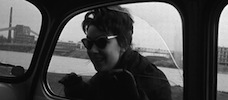
Une histoire d’eau
1958 -

The 400 Blows
1959 -
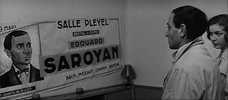
Shoot the Piano Player
1960 -
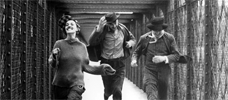
Jules and Jim
1962 -
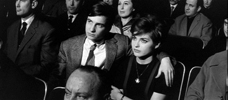
Antoine and Colette
1962 -
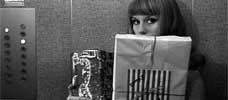
The Soft Skin
1964 -
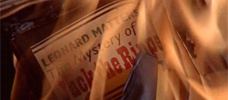
Fahrenheit 451
1966 -
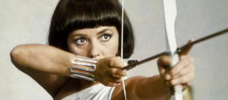
The Bride Wore Black
1968 -
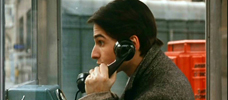
Stolen Kisses
1968 -

Mississippi Mermaid
1969 -
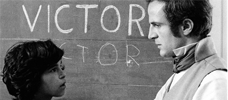
The Wild Child
1970 -

Bed and Board
1970 -

Two English Girls
1971 -
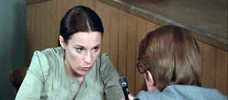
Such A Gorgeous Kid Like Me
1972 -

Day for Night
1973 -

The Story of Adele H.
1975 -

Small Change
1976 -
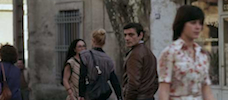
The Man Who Loved Women
1977 -
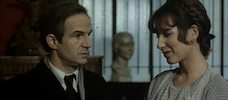
The Green Room
1978 -
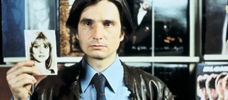
Love on the Run
1979 -

The Last Metro
1980 -
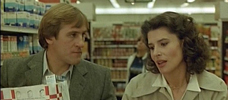
The Woman Next Door
1981 -
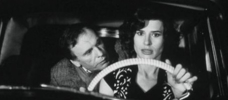
Confidentially Yours!
1983
We don’t do comments anymore, but you may contact us here or find us on Twitter or Facebook.



